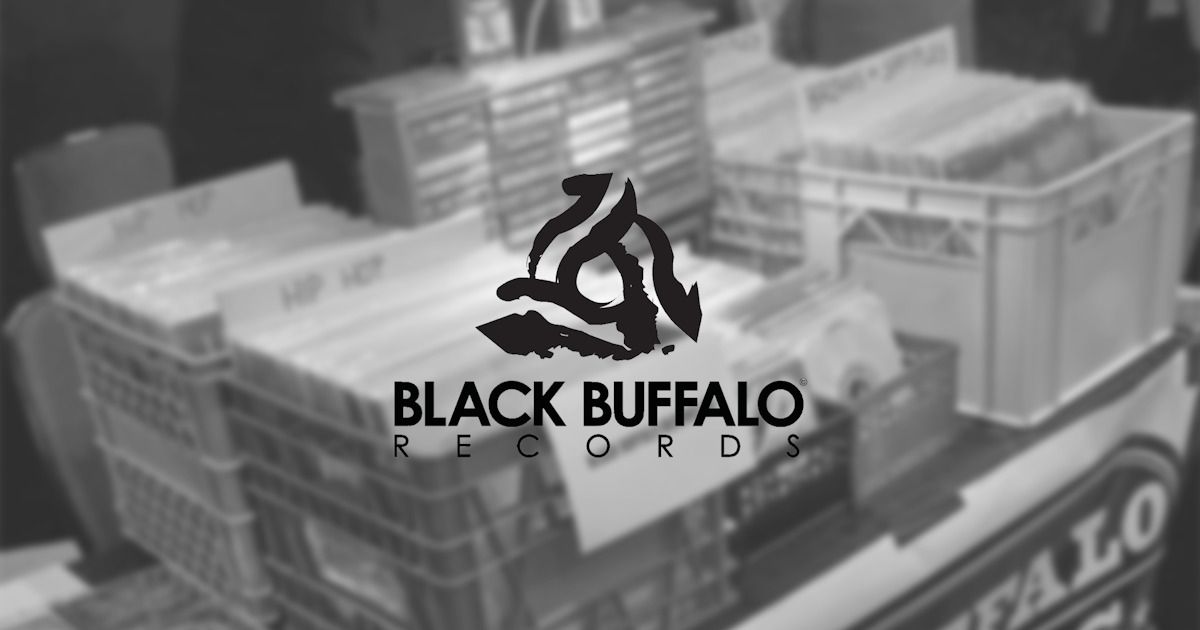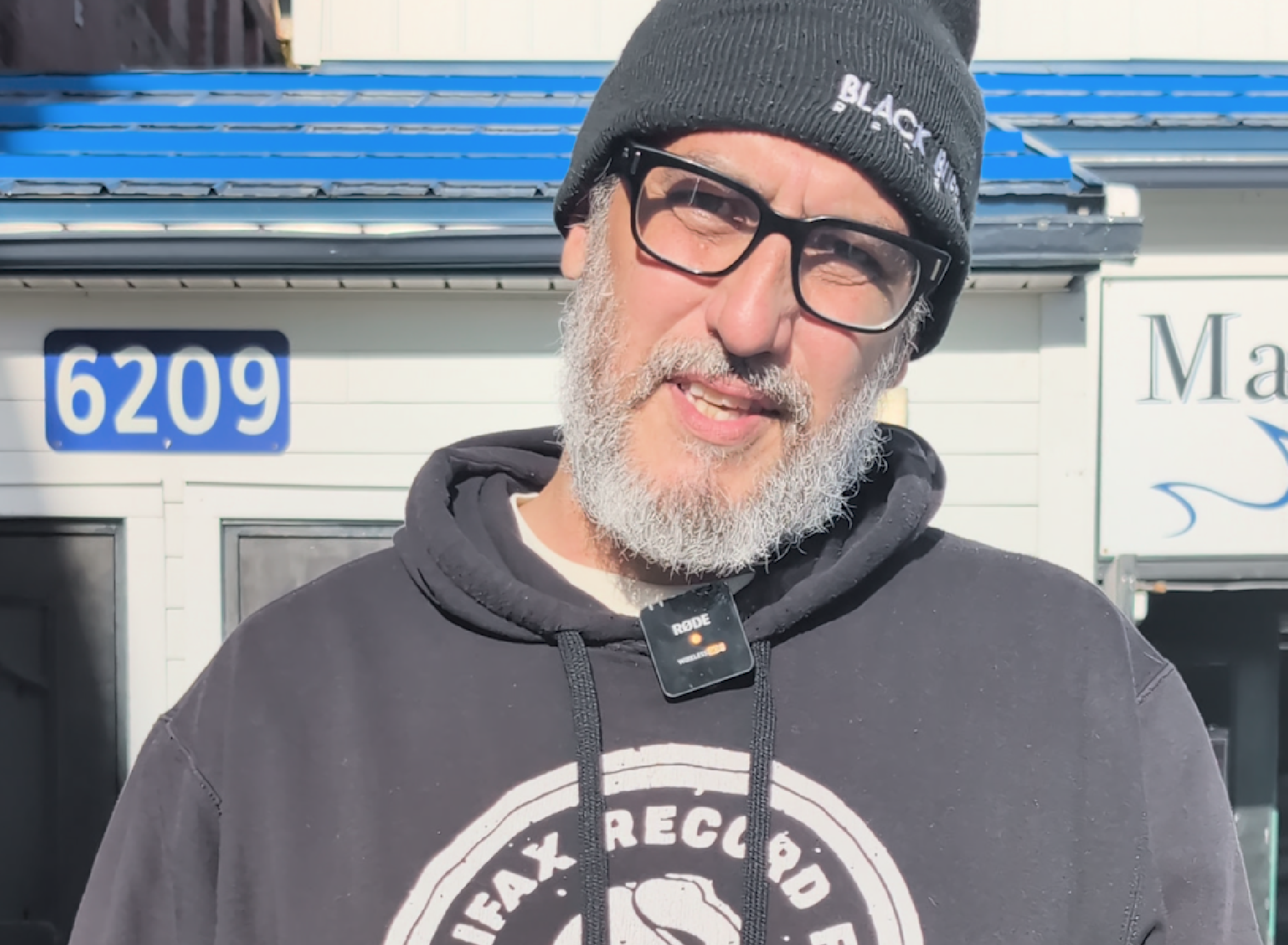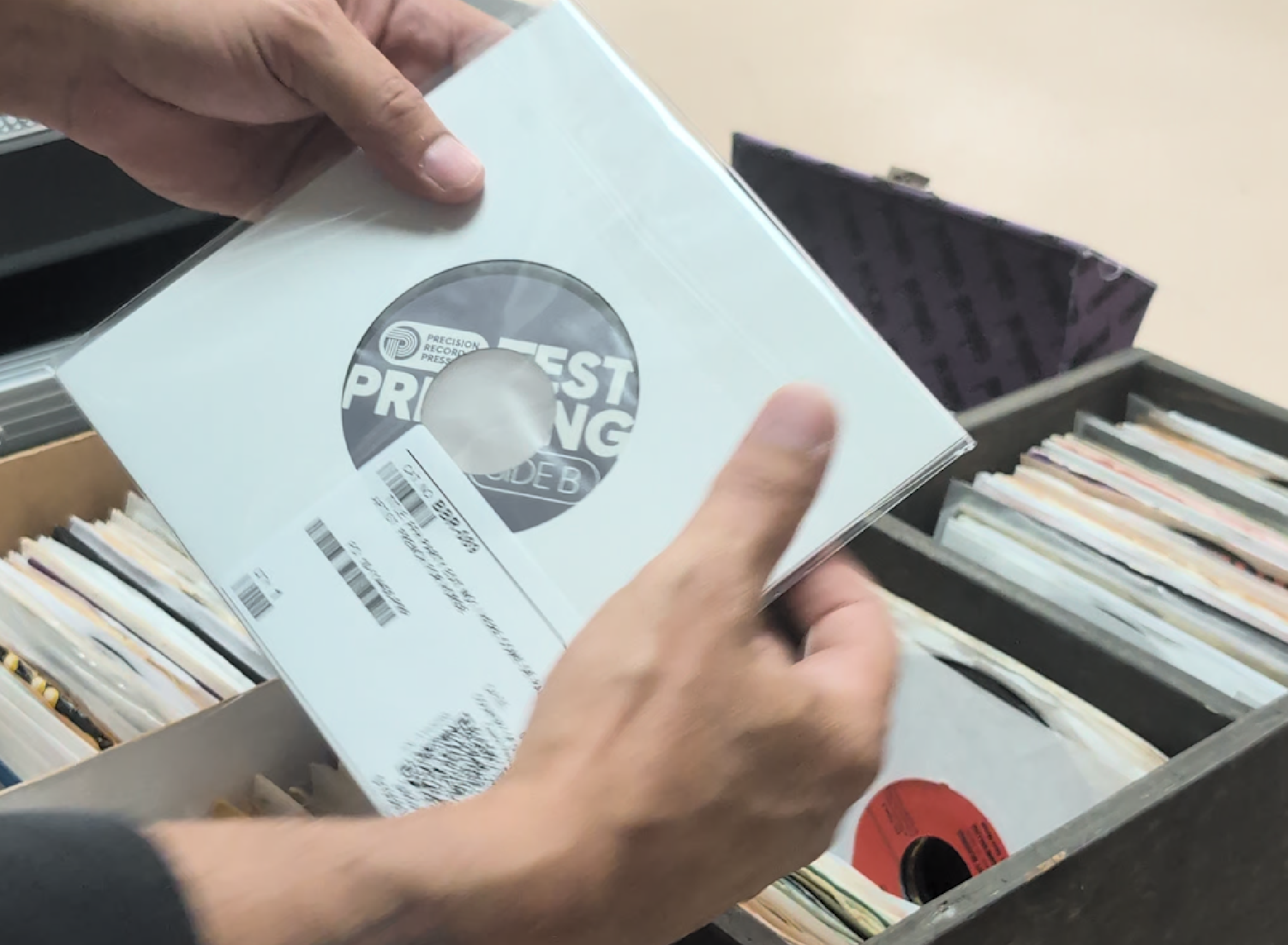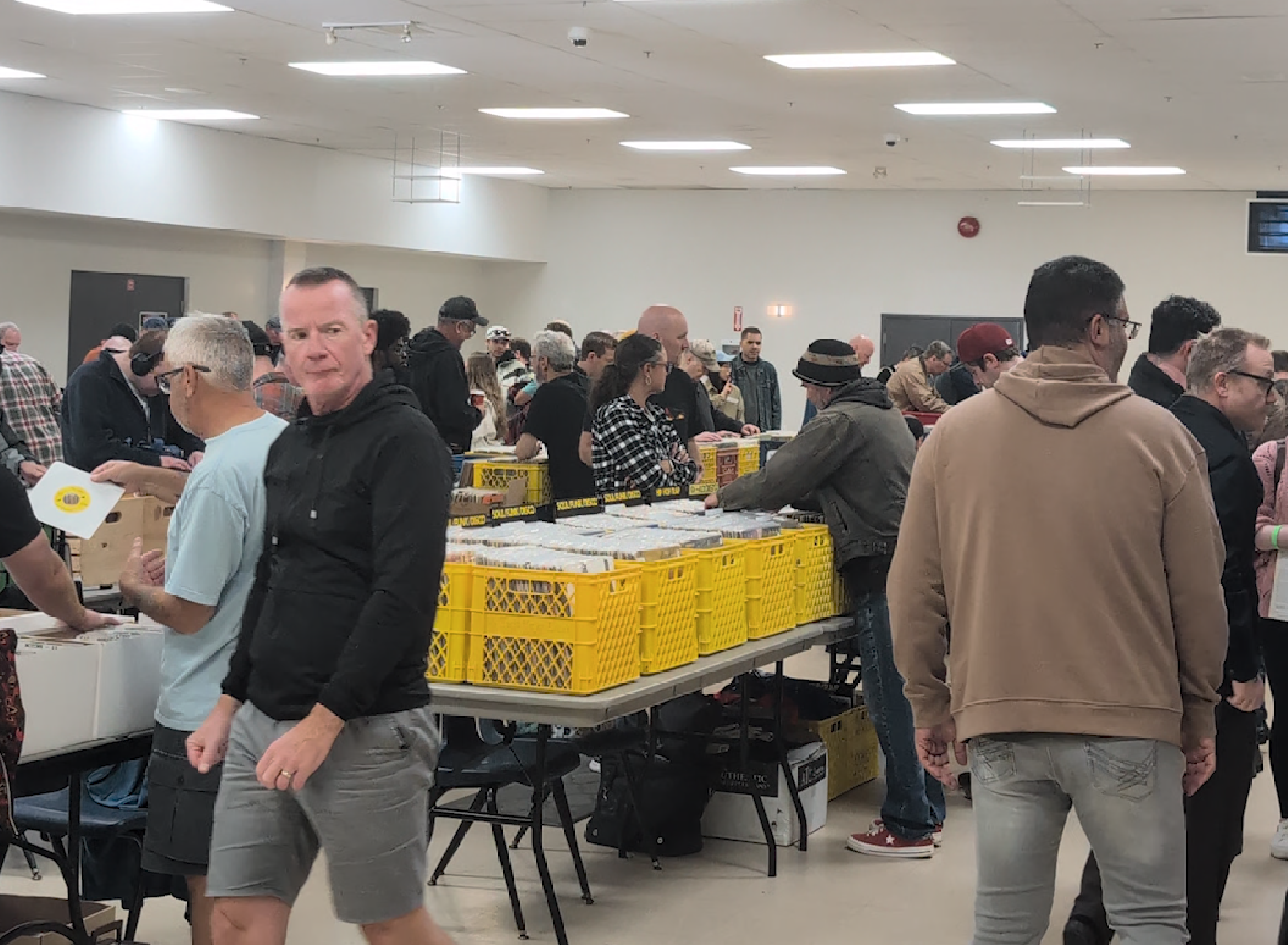Label Feature #21: Black Buffalo Records
How Halifax’s Hip-Hop collectors built a label from the ground up.
By Julia Girdharry

Kevin Beal, owner of Black Buffalo Records and founder of the Halifax Record Fair, shares the impact of preserving vinyl culture in the Maritimes.
Kevin Beal, owner of Black Buffalo Records and founder of the Halifax Record Fair in the spring and fall, has spent decades living inside record culture. What started as buying and selling second-hand vinyl out of his garage eventually turned into a label that documents the Maritimes’ underground Hip-Hop scene on wax.
Black Buffalo Records, based in Nova Scotia, has been pressing and preserving the region’s Hip-Hop culture since 2016. What began as a small record shop and local fair has evolved into a label championing Canadian producers, DJs, and artists who keep vinyl alive within the underground music scene through rhymes, honest storytelling, and community.
In this interview, Kevin shares how Black Buffalo Records came to life, the legacy of Halifax’s Hip-Hop scene, and what it means to build an independent label on the East Coast.
Building a scene, one fair at a time
We met Kevin and Kumud, two key figures behind the success of both the Halifax Record Fair and Black Buffalo Records. Twice a year, the Black Buffalo team brings Halifax together for a full day of crate digging and story swapping, creating an experience that goes beyond what a record shop alone can offer.
Not only do they handle the foundational work of organizing, but they also DJ throughout the day, keep the coffee pots full, and hand out wristbands. Their record fair is one of the best places to pick up rare 7-inch gems from the Black Buffalo vault and dig into their carefully curated personal collections, which trace the story of how Hip-Hop came to be in the Maritimes.
One record you might not expect to see that Kevin has in his possession is an Italian press of Skull Snaps, a highly sought-after release whose drum break on “It’s a New Day” has been sampled in over 500 Hip-Hoptracks by artists like Eric B. & Rakim and Run-D.M.C.
Together, Kevin and Kumud represent Halifax in both its people and its vinyl culture. Their encyclopedic knowledge and lived experience show how understanding the physical medium goes far beyond listening.
Can you introduce yourself and Black Buffalo Records?
My name is Kevin Beal, and I’m the owner of Black Buffalo Records. We’ve been putting out vinyl releases since 2016, and our next release will be number 89.
Starting the label was a childhood dream, and I knew getting involved with records was my way into the music scene, so my start wasn’t with the label itself. The label grew out of years of collecting and selling physical media. Back in 2008 to 2009, I was selling records out of my garage and doing really well.
After that, I joined a collective selling curios and antiques, and I handled the record section. That gave me a lot of local exposure and community support. I realized how strong the interest in records still was, so the next step was organizing the Halifax Record Fair.
How did you get into buying records and curating a collection of physical media?
I’ve always been a huge music fan. As a kid, I’d take my allowance every week and go to the store to buy whatever music I could find. Vinyl was always in my life. My parents played records in the house, which was the thing in the 80s. I remember my mom had one of those old hi-fi stereos where you lift up the top and stack records in. I really liked the discovery aspect of collecting.
When I first started seriously collecting, I was buying large collections. Around ten years ago, the biggest was the CBC Halifax radio library. Any Canadian artist who put anything out would have submitted something to the CBC, and they would have put it on their shelf. They cleared everything out, and I bought over 30,000 records. An 18-wheeler truck with twenty pallets of vinyl pulled up to the driveway of my very small home at the time. I discovered rare Canadian releases, 80s electronic albums, punk records, and more. I learned about a lot of important records and genres. That one collection ran the record store for about five years.
In the late 80s, I was into Hip-Hop. There wasn’t a lot of Hip-Hop available on vinyl in Halifax, so I was buying a lot of cassettes, going to estate sales, buying tapes, and then, eventually, vinyl just died out in the 90s. But DJ culture kept it alive through the mid-90s and mid-2000s, and that is where I collected tons of hidden gems that really led me to the label.


How did the Halifax Record Fair come about, and what role did it play in shaping your path into the vinyl industry?
What really started everything was the record fair in 2011. At the time, I ran a record store called Black Buffalo from 2011 to 2016. That event boosted vinyl awareness and inspired me to eventually launch the label.
So many different music lovers visit the record fair every year. It’s all generations. You’ll have older collectors in their 60s who only want to buy a specific type of Jazz, and then you’ll have newer collectors with their kids, introducing them to their favourites. It’s all driven by the attraction of a physical product in your hand with the artwork, as opposed to streaming services, where you’re not really interacting with the music.
Seeing people interact with others who have the same interests is the foundation of it all. That is why the record fair is so popular; it is a space where like-minded people get together, talking about the same thing. It’s enjoyable and has always been part of culture.
The resurgence of vinyl from Record Store Day, along with running the Halifax Record Fair, really drove the business to the point where I’d rather focus on the label than haul thousands of records around.


In a region largely recognized for indie and folk music, how did Halifax become home to a growing hip-hop and vinyl scene?
I think because there wasn’t much of a Hip-Hop scene in Halifax, there was a real need for it, which is why the music community was so welcoming. Working with a few producers and artists from this region really helped build up a good résumé and let us release music we genuinely liked.
I love Buck 65. He’s one of the biggest artists in Hip-Hop out of the region and is very well-known and respected. Jorun was also instrumental in the groundwork. He and Buck 65 laid a lot of the foundation for the local Hip-Hop scene. Jorun is a very talented producer. Buck 65, in his own right, is a great producer. When he first started, he was rapping while Jorun was DJing. They had shows at the local university, CKDU, and from there, they fostered a bigger culture.
From Jorun, we connected with Skratch Bastid, who would be well-known in bigger circles. Those two are still very productive today.
One notable local artist is Aquakultre. He’s really building a name for himself and is on his second release. We put out his first, and that helped shine a light on Black Buffalo Records because he is touring and doing the big festivals.
Up until that point, getting your music on vinyl was very difficult and expensive. As an independent artist, you would have to finance and market your music alone, and that is sometimes not in the budget. Starting the label allowed artists to put music on vinyl, which was a game-changer. For a lot of artists, that is the ultimate goal when it comes to merchandise.
Most Black Buffalo Records releases are Hip-Hop or DJ edits, but a few early releases weren’t. What made you want to experiment with genres like punk and blues in those first years?
Out of the 89 releases that we’ve put out, about 99% are Hip-Hop DJ edits. However, in the early days of Black Buffalo Records, we put out a punk single from a local band called Cryptorips. Our third release was from a local blues artist named Skinny Lee.
We didn’t really have a name in the business then. Those guys were friends, so it was more of them helping me out. It was like, “Here’s some music, release it.” That gave me experience with releasing music and pressing it.
As soon as I put out Skinny Lee and Cryptorips, a lot of people’s eyes and ears perked up. After those releases, the DJ edits took off and became popular.
Why do Black Buffalo and a majority of the Hip Hop DJ community still prefer 7" vinyl?
DJ culture had another boom when Reloop released a 7-inch turntable. DJs became excited to get as much 7-inch product as they could, and it has become the predominant format for a lot of club DJs.
7-inch records are ideal for portable setups and fast transitions, especially for party edits, breaks, and scratch routines. They are easier to carry to gigs or fairs and are perfect for selectors and mobile DJs. Many classic Funk, Soul, and Disco breaks, which are the DNA of Hip-Hop, were originally released on 7-inch. Pressing edits or flips on 45s pays homage to that lineage.
Digging for obscure 7-inch records is a rite of passage. Releasing new edits on the same format keeps that spirit alive. Lower production costs make the 7-inch ideal for experimental releases, bootlegs, or niche edits. It is also a nod to Jamaican sound system culture, where 45s ruled the dancehall and heavily influenced Hip-Hop’s early evolution. 7-inch releases often bypass mainstream distribution, which helps keep the culture low-key and community-driven.
For more information about Black Buffalo Records, please visit blackbuffalorecords.bandcamp.com.